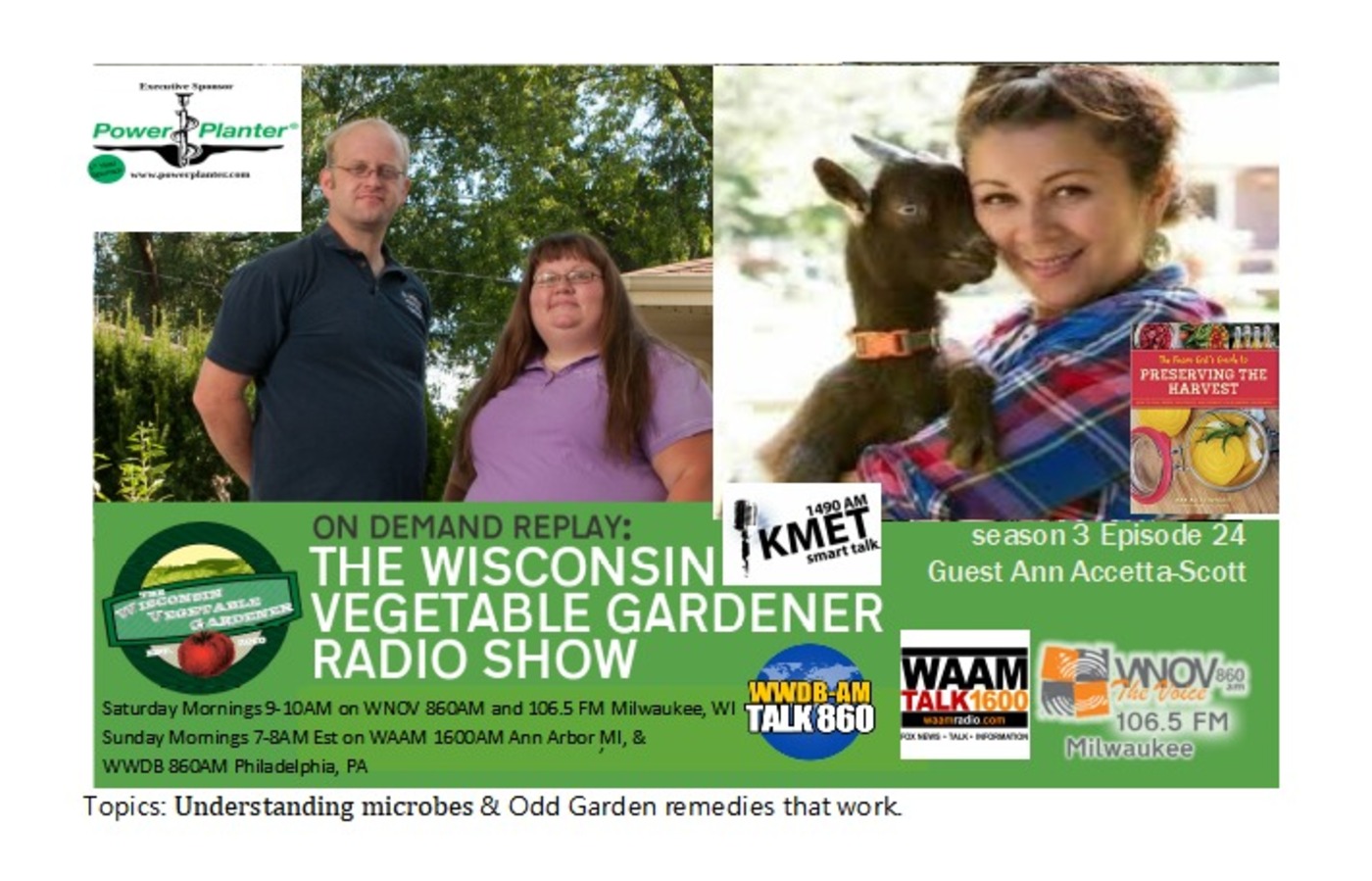S3E24 Microbes matter , Garden remedies that actually work Guest author Ann Accetta Scott - The Wisconsin Vegetable Gardener radio show
- Author
- The Gardening with Joey & Holly radio show (The Wisconsin vegetable gardener)
- Published
- Mon 12 Aug 2019
- Episode Link
- https://www.podomatic.com/podcasts/thewisconsinvegetablegardenerpodcast/episodes/2019-08-12T04_00_00-07_00
Replay of The Wisconsin Vegetable Gardener Radio Show from 8-10-19
Heard on 860AM WNOV & W293cx 106.5FM Milwaukee, WI Saturday mornings 9-10AM CST
Heard on WAAM 1600 AM Ann Arbor, MI Sundays 7-8AM est
Heard on WWDB 860 AM Philadelphia, PA Sundays 7-8AM est
Heard on KMET 1490 AM Tuesdays 9 - 10 AM pst Banning, CA
listen here during show hours for your station:
WNOV https://tinyurl.com/y8lwd922
WWDB: https://wwdbam.com/
WAAM https://tinyurl.com/p68cvft
KMET https://www.kmet1490am.com/
Check out https://thewisconsinvegetablegardener.com/
In Segment 1 Joey and Holly talk about why Microbes are so important to your garden.
Microbes matter in the soil
Microbes are tiny!!!!!!
There are more microbes in a teaspoon of soil than there are people on the earth. Soils contain about 8 to 15 tons of bacteria, fungi, protozoa, nematodes, earthworms, and arthropods.
Soil microorganisms exist in large numbers in the soil as long as there is a carbon source for energy.
large number of bacteria in the soil exists, but because of their small size, they have a smaller biomass.
Actinomycetes are a factor of 10 times smaller in number but are larger in size so they are similar in biomass to bacteria.
Fungus population numbers are smaller but they dominate the soil biomass when the soil is not disturbed. Bacteria, actinomycetes, and protozoa are hardy and can tolerate more soil disturbance than fungal populations so they dominate in tilled soils while fungal and nematode populations tend to dominate in untilled or no-till soils.
Organic matter decomposition serves two functions for the microorganisms, providing energy for growth and suppling carbon for the formation of new cells.
Soil organic matter (SOM) is composed of the "living" (microorganisms), the "dead" (fresh residues), and the "very dead" (humus) fractions. The "very dead" or humus is the long-term SOM fraction that is thousands of years old and is resistant to decomposition.
Soil organic matter has two components called the active (35 percent) and the passive (65 percent) SOM.
Soil organic matter can be broken down into its component parts. One hundred grams (g) or 100 pounds (lbs) of dead plant material yields about 60–80 g (lbs) of carbon dioxide, which is released into the atmosphere. The remaining 20–40 g (lbs) of energy and nutrients is decomposed and turned into about 3–8 g (lbs) of microorganisms (the living), 3–8 g (lbs) of non-humic compounds (the dead), and 10–30 g (lbs) of humus (the very dead matter, resistant to decomposition). The molecular structure of SOM is mainly carbon and oxygen with some hydrogen and nitrogen and small amounts of phosphorus and sulfur. Soil organic matter is a by-product of the carbon and nitrogen cycles.
Tilled or unhealthy soils release a lower percent of nitrogen due to lower microbial activity
For several years, crops on the newly tilled soil will grow better than the surrounding soils, but over time the soil will be depleted of carbon and the newly tilled soil will become less fertile because the carbon is oxidized as carbon dioxide and lost to the atmosphere.
In segment 2 Joey and Holly talk about some odd Garden remedies that actually work
The composition of urine varies from person to person, but it generally has an NPK ratio of 11-1-2. The nitrogen found in human urine ensures lush foliage growth; hence, it is best for greens and grassy plants like corn. The high salt content may scorch the plants if you pee directly on them, so it is better to do it a little away from the base of the plant. Better still, collect the pee and dilute it with 10 times water before applying it to the root zone. For tender plants and seedlings, dilute it further.
Bury your kitchen scraps
Add egg shells
Wood ash from wood burning stoves and fireplaces can alkalinize the soil in your asparagus patch and vegetable beds growing broccoli, beans, and beet
Get rid of aphids with soap and water
Neem oil
Baki(continued)
